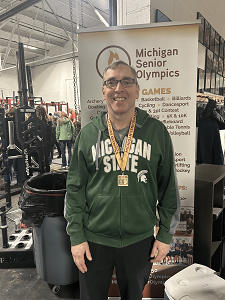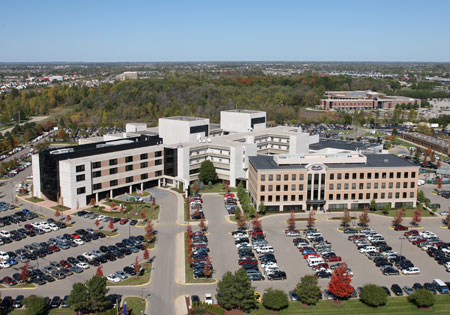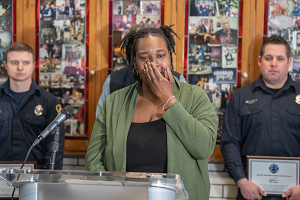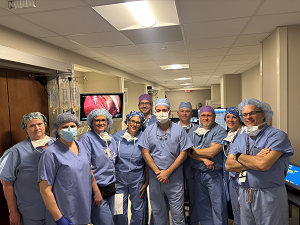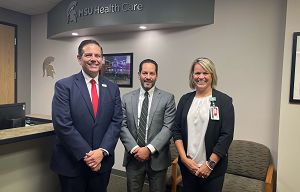A DoD Deployment and a Public Plea for Blood Donations

DETROIT (January 13, 2022) – As COVID-19 hospitalizations continue to climb, Henry Ford Health System said Thursday that a U.S. Department of Defense (DoD) medical team would be deployed to Henry Ford Wyandotte Hospital, and made a public plea for blood donations because of a critically low blood supply affecting hospitals nationwide.
The DoD deployment at Henry Ford Wyandotte is the second phase of a two-part deployment under the U.S. Department of Health & Human Services and DoD medical disaster deployments. The team has the expertise to support up to 24 beds as well as provide support on inpatient and surgical patient units.
Details about the deployment and appeal for blood donations came during a briefing with reporters led by Bob Riney, President of Healthcare Operations and Chief Operating Officer, and Adnan Munkarah, M.D., Executive Vice President and Chief Clinical Officer.
“We are grateful for the medical support coming from the Department of Defense to provide further support and relief to our team at Henry Ford Wyandotte Hospital,” Riney said.
A federal Disaster Medical Assistance Team (DMAT), the first phase of the two-part federal deployment, has been providing “significant” support and relief at the hospital since Jan. 10, Riney said, “working seamlessly with our team to provide the best and safest care for our patients and the Downriver community.” The DMAT deployment ends Jan. 21.
The HHS DMAT civilian deployment is usually limited to two weeks, followed by the DoD deployment that lasts for a minimum of 30 days, according to federal officials. Similar two-phase deployments have occurred at other Michigan hospitals in recent weeks.
“We have systemic challenges with the incredible volume and very tired medical practitioners and vacancies that we’re looking to fill. That’s true of all health systems that have been in the middle of this surge,” Riney said. “This is what I would call a real help (as it) does add meaningful clinical capacity. But it’s also a mental boost. It is a great sign of hope, of optimism to our care teams that they’re not alone. Even our care teams know it doesn’t begin to solve problems, but it’s solves some. That is a real benefit. But it’s also a producer of hope. And that’s important.”
The pandemic has exacerbated the nation’s blood supply, leading three national blood organizations to declare a national crisis. Henry Ford’s blood bank is running critically low – with a one to two-day supply on hand. Dr. Munkarah said that while the health system has not canceled any surgeries, one traumatic event could drain its supply.
“Our ask to the community is to please step forward and give a blood donation,” Dr. Munkarah said. “Anyone 17 years or older is eligible and the process take about one hour. One pint of blood can save up to 3 lives.”
People can make an appointment to donate at https://www.versiti.org/give or https://www.redcross.org/
Dr. Munkarah reported that COVID hospitalizations continue to rise across the health system and includes a small number of children under 17. As of Thursday morning, Henry Ford had 520 patients hospitalized with COVID or waiting to be admitted. He said the positivity rate remained exceedingly high at 36.68%. One third of people testing positive for COVID are ages 21 to 40.
At least 65% of those hospitalized are unvaccinated. Underscoring the importance of a booster shot, Dr. Munkarah said more than 90% of people being hospitalized haven’t received their third dose. He also reminded people to get their flu shot.
“The booster has definitely minimized the impact of COVID,” Dr. Munkarah said. “This is our way out (of the pandemic).”
As of Monday, Jan. 10, Henry Ford had 87 beds temporarily closed due to staffing challenges. This included 64 at Henry Ford Hospital, 22 at Henry Ford Wyandotte and 1 at Henry Ford Allegiance Health. This represents about 3.6% of total beds across the health system. “The number of bed closures fluctuate depending on conditions that we monitor on a daily basis,” Riney said.
As of Thursday morning, 593 team members were out of work due to COVID. “This is due to the fast-spreading omicron in the community. These are not work related,” Riney said. “The continuous spread of COVID not only puts a strain on health systems because of the number of patients that we see but it continues to expose our frontline healthcare workers in getting community spread, when they are not wearing the PPE that they are wearing inside the healthcare organization.”
Riney implored the community to “be part of the solution.”
“This is up to us and our behaviors,” he said. “Getting vaccinated, getting a booster, mask wearing when in public settings and other prevention strategies we know will not eradicate. We’re not suggesting they will eradicate. But they will minimize the pressure points we are feeling both as a community and as a health system provider.”
###
NEWS MEDIA ONLY may contact: David Olejarz / David.Olejarz@hfhs.org / 313-303-0606
.svg?iar=0&hash=F6049510E33E4E6D8196C26CCC0A64A4)

/hfh-logo-main--white.svg?iar=0&hash=ED491CBFADFB7670FAE94559C98D7798)
